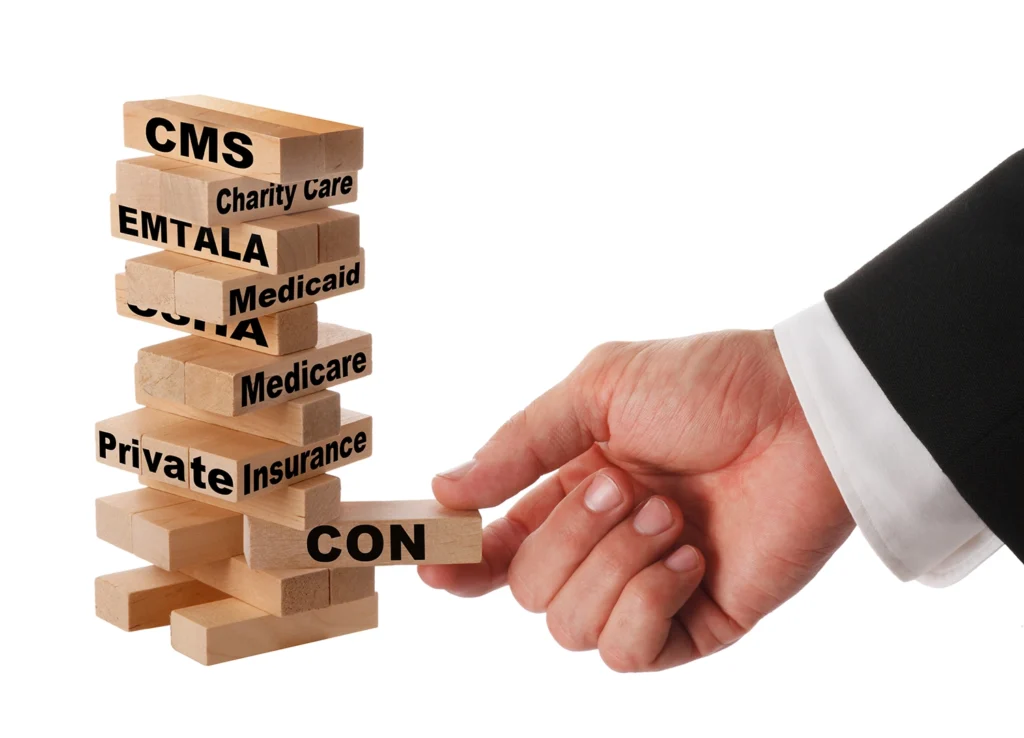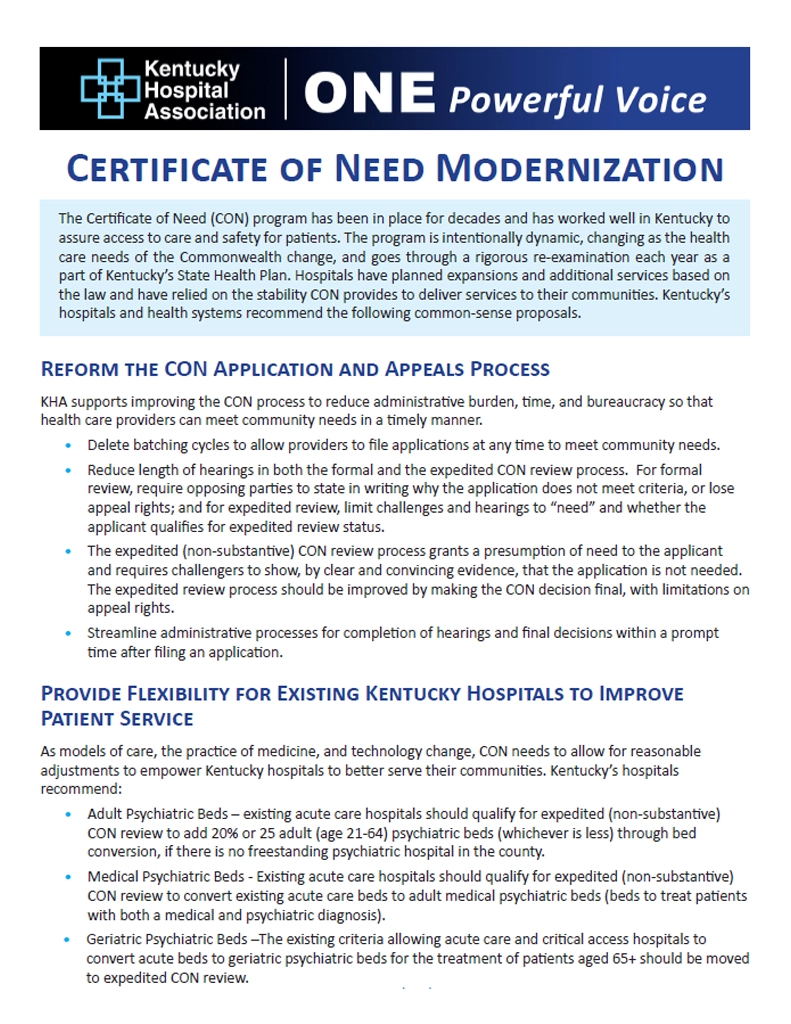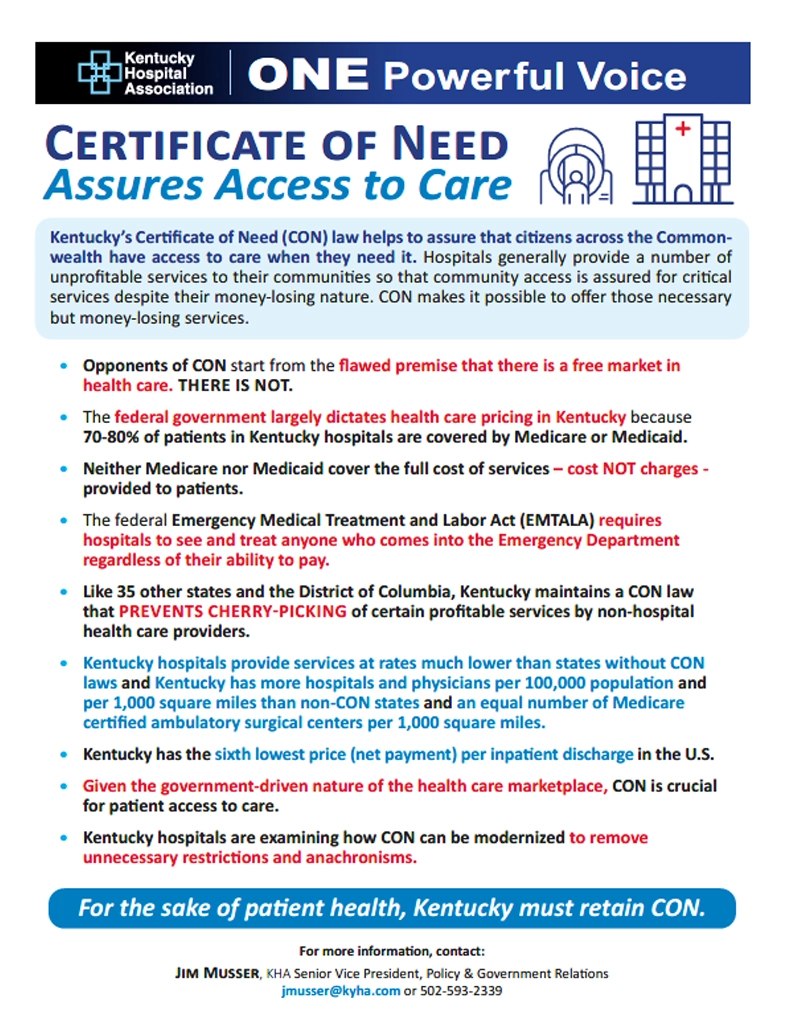Home Certificate of Need (New)
Certificate of Need (New)
What Is a Certificate of Need Program?
A Certificate of Need program allows for the development of new health care facilities (or an expansion of an existing facility or service) in areas where a state agency has determined that a need exists. Certificate of Need programs are then utilized to approve expenditures on the development of these new facilities. Often, CON laws require health care facilities to provide financial assistance or significant cost reductions for low-income patients in order to meet the requirements to establish a new facility.
As of January 2024, Certificate of Need programs are in place in 35 states, as well as Washington D.C.


Certificate of Need Modernization
Kentucky’s hospitals and health systems recommend common-sense proposals to improve the Certificate of Need program. (2023)
What Type of Services Are Regulated by Certificate of Need Laws?
The following health care services and institutions fall under the regulatory responsibility of Kentucky’s Certificate of Need laws: hospitals (including psychiatric and physical rehabilitation), substance use disorder facilities, nursing homes and retirement communities, intermediate care, personal and family care homes, outpatient clinics, ambulatory care facilities and surgical centers, emergency care centers, ambulance services, hospice, mental health facilities, and home health agencies.
You may review Kentucky’s Certificate of Need law, Ky. Rev. Stat. § 216B.010 et seq., in full for more information.
How Does the Certificate of Need Program Benefit Kentucky?
Kentucky’s Certificate of Need law helps to assure that citizens across the Commonwealth have access to health care.
Kentucky hospitals provide services at rates much lower than states without CON laws. Hospitals generally provide a number of unprofitable services to their communities so that community access is assured for critical services despite their money-losing nature. CON makes it possible to offer those necessary but money-losing services.
According to a 2019 study conducted by Ascendient, Kentucky provides better access to most healthcare services than states without a Certificate of Need program. Kentucky has a higher rate of hospitals per 100,000 people than the median of No-CON states. In addition, Kentucky has nearly three times the number of hospitals per 1,000 square miles than the median of No-CON states, nearly two times the number of physicians per 1,000 square miles, and approximately the same number of Medicare-certified ASCs per 1,000 square miles. Of note, Kentucky has more hospitals per 1,000 square miles than California or Texas.

Certificate of Need Assures Access to Care
Hospitals generally provide a number of unprofitable services to their communities. CON makes it possible to offer those necessary but money-losing services. (2023)
How Do Kentucky Hospitals Rely on the Certificate of Need Program?
The federal Emergency Medical Treatment and Labor Act (EMTALA) requires hospitals to see and treat anyone who comes into the Emergency Department regardless of their ability to pay. 70 to 80 percent of Kentucky hospital patients, on average, are covered by Medicare or Medicaid (or both), where government sets payment rates that are below actual cost, requiring cross subsidization for hospitals to maintain essential services. As a result, the federal government largely dictates health care pricing in Kentucky.
Neither Medicare nor Medicaid cover the full cost of services provided to patients. Kentucky has the seventh highest percentage of inpatient discharges attributable to Medicare and Medicaid patients, and a higher percentage than all no-CON states. The Certificate of Need law is critical to supporting a more level playing field among providers, especially those serving more vulnerable communities that rely on Medicare and/or Medicaid.
Are Certificate of Need Programs Periodically Updated?
The program is intentionally dynamic, changing as the health care needs of the Commonwealth change, and goes through a rigorous re-examination each year as a part of Kentucky’s State Health Plan. Hospitals have planned expansions and additional services based on the law and have relied on the stability CON provides to deliver services to their communities.
As models of care, the practice of medicine, and technology change, CON needs to allow for reasonable adjustments to empower Kentucky hospitals to better serve their communities.

Retain Certificate of Need for Freestanding Birthing Centers
Certificate of Need assures quality care for mothers and babies. (2023)
How Can the Certificate of Need Program be Modernized to Benefit Hospitals and Patients?
The Kentucky Hospital Association supports improving the Certificate of Need process to reduce administrative burden, time, and bureaucracy so that health care providers can meet community needs in a timely manner. KHA’s recommendations include:
- Delete batching cycles to allow providers to file applications at any time to meet community needs.
- Reduce length of hearings in both the formal and the expedited CON review process.
- Streamline administrative processes for completion of hearings and final decisions within a prompt time after filing an application.
- Retain formal review for services, such as new hospitals, NICUs, and open heart surgery, that could leave many patients without access to care; or they require certain minimum numbers of procedures to ensure competence and quality in delivery of the service.
- Updated KHA Certificate of Need Analysis (2023)
- Retain Certificate of Need (2023)
- Kentucky Regulation for CON Program
- CON Requirements: Kentucky vs Surrounding States
- 2019 Certificate of Need Study (Ascendient)


